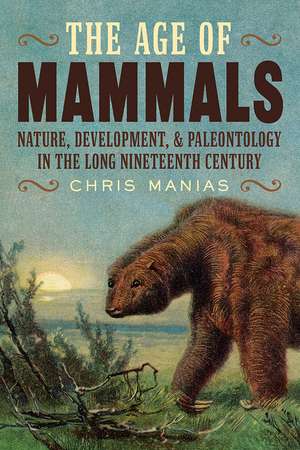The Age of Mammals: Nature, Development, and Paleontology in the Long Nineteenth Century: INTERSECTIONS: Histories of Environment
Autor Chris Maniasen Limba Engleză Hardback – 27 iun 2023
Din seria INTERSECTIONS: Histories of Environment
-
 Preț: 436.80 lei
Preț: 436.80 lei -
 Preț: 200.41 lei
Preț: 200.41 lei -
 Preț: 400.33 lei
Preț: 400.33 lei -
 Preț: 430.27 lei
Preț: 430.27 lei -
 Preț: 359.45 lei
Preț: 359.45 lei -
 Preț: 492.26 lei
Preț: 492.26 lei -
 Preț: 427.77 lei
Preț: 427.77 lei -
 Preț: 459.98 lei
Preț: 459.98 lei -
 Preț: 333.77 lei
Preț: 333.77 lei - 15%
 Preț: 457.24 lei
Preț: 457.24 lei -
 Preț: 461.72 lei
Preț: 461.72 lei -
 Preț: 320.52 lei
Preț: 320.52 lei -
 Preț: 350.79 lei
Preț: 350.79 lei -
 Preț: 387.44 lei
Preț: 387.44 lei
Preț: 500.91 lei
Nou
Puncte Express: 751
Preț estimativ în valută:
95.86€ • 104.09$ • 80.52£
95.86€ • 104.09$ • 80.52£
Carte disponibilă
Livrare economică 02-16 aprilie
Preluare comenzi: 021 569.72.76
Specificații
ISBN-13: 9780822947806
ISBN-10: 0822947803
Pagini: 296
Dimensiuni: 152 x 229 x 43 mm
Greutate: 0.73 kg
Editura: University of Pittsburgh Press
Colecția University of Pittsburgh Press
Seria INTERSECTIONS: Histories of Environment
ISBN-10: 0822947803
Pagini: 296
Dimensiuni: 152 x 229 x 43 mm
Greutate: 0.73 kg
Editura: University of Pittsburgh Press
Colecția University of Pittsburgh Press
Seria INTERSECTIONS: Histories of Environment
Recenzii
"An extremely valuable contribution to our understanding of nineteenth- and early twentieth-century paleontology."
—H-Net Reviews
"Manias’ work really excels in reclaiming and redescribing the practice of palaeontology in the nineteenth century in all of its expansionist, political, and cultural complexity."
—Palaeontologia Electronica
"This book is certainly fascinating."
—Choice
“Age of Mammals is a wide-ranging, fascinating, and definitive account of how ancient mammals were discovered and given meaning through heated debates about lost life on earth. Stories of fossils and their finders, from famed scientists to erased local and Indigenous experts, and the sites in which fossils were give meanings, from fieldwork to exhibitions, are deftly woven together to show that the knowledge and world making of paleontology were tied to global fieldwork, capitalist resource extraction, museum collections, and ideas about the rightful place of humans in the modern world. This book establishes Chris Manias as a significant scholar of the history of life sciences and will be invaluable to anyone interested in the legacies of how life on earth has been imagined.”—Sadiah Qureshi, University of Birmingham
“Dinosaurs get all the attention, from museum visitors as well as historians. But with this brilliant new book, Chris Manias sets the record straight and shows that mammalian paleontology is where it’s at. Deeply researched and beautifully written, The Age of Mammals is brimming with fresh insights and novel interpretations. Scientists invested mammals with particular significance because their evolution presaged the development of our own species. This makes them an ideal site to examine how widespread ideas about evolutionary progress and biological hierarchy emerged from the entanglement between science and empire. This book is also a pleasure to read, taking readers on a wide-ranging tour through the history of the earth sciences that spans several centuries and covers the entire globe.”
—Lukas Rieppel, author of Assembling the Dinosaur: Fossil Hunters, Tycoons, and the Making of a Spectacle
—H-Net Reviews
"Manias’ work really excels in reclaiming and redescribing the practice of palaeontology in the nineteenth century in all of its expansionist, political, and cultural complexity."
—Palaeontologia Electronica
"This book is certainly fascinating."
—Choice
“Age of Mammals is a wide-ranging, fascinating, and definitive account of how ancient mammals were discovered and given meaning through heated debates about lost life on earth. Stories of fossils and their finders, from famed scientists to erased local and Indigenous experts, and the sites in which fossils were give meanings, from fieldwork to exhibitions, are deftly woven together to show that the knowledge and world making of paleontology were tied to global fieldwork, capitalist resource extraction, museum collections, and ideas about the rightful place of humans in the modern world. This book establishes Chris Manias as a significant scholar of the history of life sciences and will be invaluable to anyone interested in the legacies of how life on earth has been imagined.”—Sadiah Qureshi, University of Birmingham
“Dinosaurs get all the attention, from museum visitors as well as historians. But with this brilliant new book, Chris Manias sets the record straight and shows that mammalian paleontology is where it’s at. Deeply researched and beautifully written, The Age of Mammals is brimming with fresh insights and novel interpretations. Scientists invested mammals with particular significance because their evolution presaged the development of our own species. This makes them an ideal site to examine how widespread ideas about evolutionary progress and biological hierarchy emerged from the entanglement between science and empire. This book is also a pleasure to read, taking readers on a wide-ranging tour through the history of the earth sciences that spans several centuries and covers the entire globe.”
—Lukas Rieppel, author of Assembling the Dinosaur: Fossil Hunters, Tycoons, and the Making of a Spectacle
Notă biografică
Chris Manias is a historian of science based at King’s College London, where he is senior lecturer in the history of science and technology. He is a member of the History of Science Society and the British Society for the History of Science, and is a Fellow of the Royal Historical Society.
